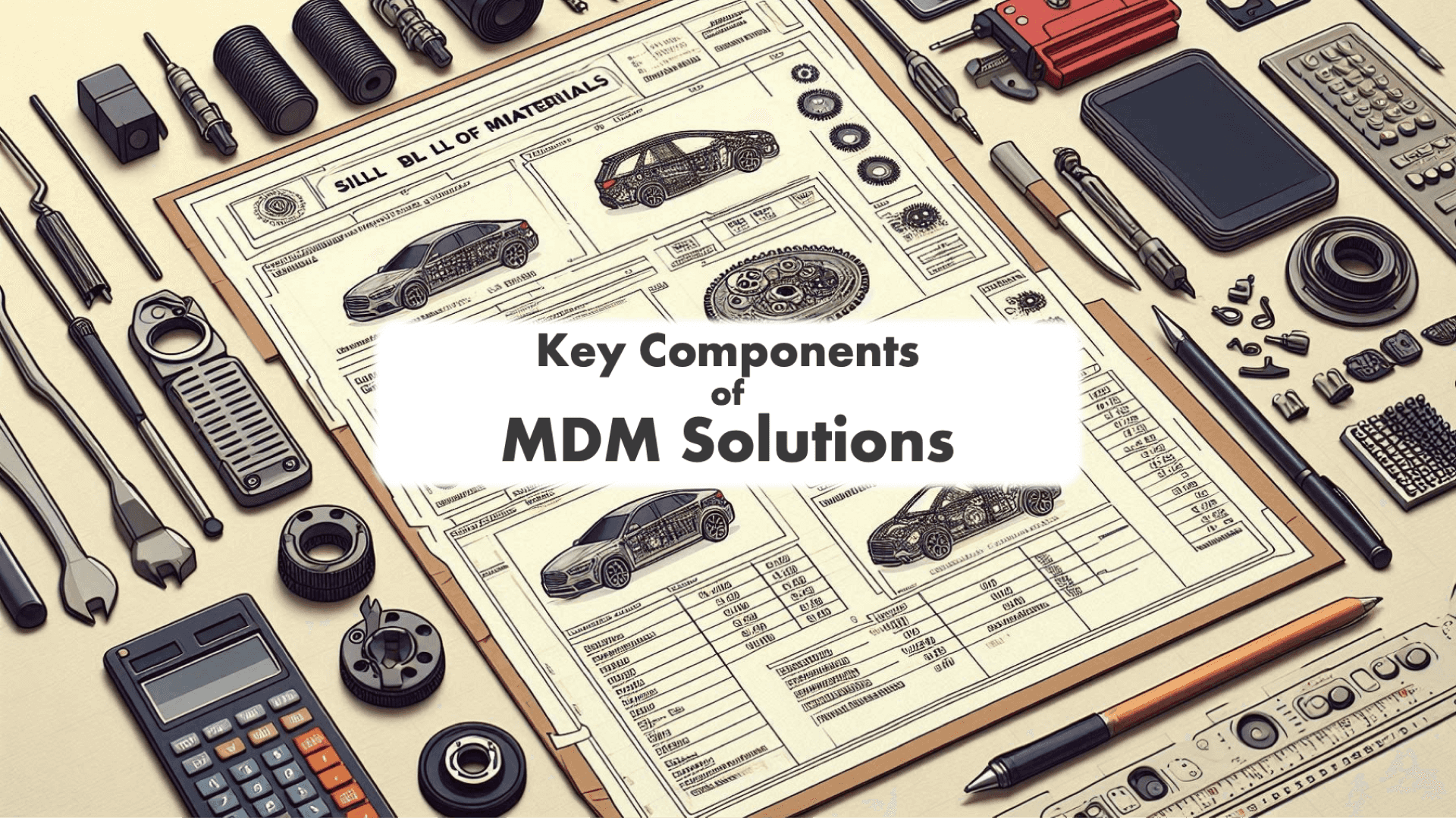Jan 12th, 2024
Modern industries in the USA and E.U. must bank on automation and scale to maintain their economic viability.
Both functions require industrial managers to sift through a ton of data, something that eventually falls out of a man/woman’s scope of capabilities. Computers solved the problem in the first stage of this industrial information revolution. However, given the scale of operations, many data formats, diverse sources and users of industrial data manufacturing PIM takes the limelight.
In short, PIM solutions for manufacturing companies or OEMs can help them:
- Maintain a single source of truth for product data
- Simplify data management workflows
- Automate the synchronization and syndication of product data
- Adjust to intricate manufacturer use cases
- Ensure consistent product information that can be optimized, enhanced across all sales channels and shared with the channel partners
PIM solutions for manufacturers offer to resolve challenges on the current path of data-driven growth for them. Here’s how PIM benefits the industrial process for all scalable manufacturers:
Maintain Manufacturing Data Accuracy with PIM
Product Information Management (PIM) systems play a crucial role in maintaining product data accuracy and consistency across various channels. The PIM system uses a centralized repository for all product data. The central repository provides a source of truth for all product data.
PIM systems can further enforce governance policies to ensure data quality and validate the incoming data to ensure accuracy. Thus, PIM manufacturing ensures that industrial product data is accurate, consistent, and up to date across all channels, mitigating errors and enhancing the reliability of information.
Enhanced Collaboration
Facilitating collaboration among cross-functional teams, PIM breaks down communication barriers and ensures that all stakeholders work with the same reliable data. PIM enables cross-functional teams, including design, manufacturing, marketing, and sales, to access, share and collaborate on a single, consistent source of product information
PIM’s role-based access ensures that each team can contribute to and retrieve relevant data, fostering transparency and reducing the risk of miscommunication. Workflow automation within PIM streamlines processes such as data creation, review, and approval, facilitating seamless collaboration.
Modern PIM solutions seamlessly integrate with existing Enterprise Resource Planning (ERP) systems and enable collaboration with other business processes. PIM’s industrial product data management facilitates real-time updates and version control, ensuring that all teams work with the most accurate and up-to-date product information.
Thus, PIM manufacturing fosters efficient collaboration, reducing errors and accelerating time-to-market for OEMs.
Product Customizations & Configurations
PIM enables businesses to create flexible data models that accommodate rich product attributes and specifications. With dynamic attribute management, users can easily modify, add, or remove attributes to customize product data for different customer demands.
PIM supports variant management, allowing for the efficient handling of product variations and configurations such as size, color, or features. Rule-based configurations empower users to define criteria for product data based on specific parameters, ensuring accuracy and consistency.
PIM streamlines the customization process with product configurators, enabling interactive product configuration while maintaining overall data integrity. PIM’s scalability ensures businesses can seamlessly adapt to growing product lines, while its support for multi-language and multi-region capabilities facilitates localization and customization for diverse markets
Ultimately, PIM empowers businesses to provide personalized and relevant product information for diverse markets.
Efficient Product Lifecycle Management
Streamlining the product lifecycle, from design to end-of-life, PIM optimizes workflows and accelerates time-to-market for new products. OEMs can maintain manufacturing data accuracy with PIM, facilitating efficient Lifecycle Management (PLM) for their product portfolios.
PIM manufacturing solutions ensure that stakeholders across the product lifecycle have access to consistent, up-to-date information. It accelerates product development processes, streamlining workflows from design and prototyping to production and distribution.
PIM facilitates changes to the industrial product information that are propagated in real-time. Such capability enhances collaboration and reduces time-to-market for new products or solutions. Variant management capabilities enable manufacturers to manage product variations and support a diverse portfolio.
PIM’s integration with other enterprise systems, such as Enterprise Resource Planning (ERP) and Computer-Aided Design (CAD), ensures seamless data flow. Frictionless and reliable production data optimizes the transition between different stages of the product lifecycle.
Overall, industrial PIM empowers manufacturers to navigate the complexities of product development, enhance collaboration, and bring products to market more efficiently.
Systematic Regulatory Compliance
PIM assists industrial manufacturers in adhering to regulatory standards and certifications with robust features for tracking and managing compliance data. PIM system’s centralized and standardized product data simplifies regulatory compliance for manufacturers. As a unified hub, PIM ensures compliance information is organized, accessible, and adheres to regulatory standards.
Automated compliance checks and dynamic updates enable real-time alignment with evolving regulations, reducing the risk of non-compliance. PIM’s version control and documentation features facilitate an audit trail and efficient reporting, aiding manufacturers in meeting regulatory requirements.
You can integrate external compliance databases with PIM to ensure the latest regulatory standards. PIM’s workflow management streamlines the approval process, and real-time collaboration enables speedy compliance.
Industrial PIM empowers multinational OEMs to navigate different regulatory complexities efficiently and maintain adherence to compliance standards across diverse markets.
Supply Chain Optimization
PIM enables manufacturers to better manage their supply chains by providing real-time insights, reducing lead times, and optimizing inventory levels. PIM’s scalability and analytics empower manufacturers with insights, fostering agile decision-making and overall supply chain optimization.
Large-scale manufacturers can use the PIM system to ensure data consistency and reliability across the supply chain, reducing errors and enhancing collaboration among suppliers and distributors. Real-time updates and automated workflows of PIM manufacturing streamline the process from product design to distribution and accelerate time-to-market.
PIM’s support for variant management facilitates handling diverse product configurations, while rule-based configurations enable quick customization. Integration with other enterprise systems enhances overall coordination, and PIM’s scalability accommodates the growing complexity of product lines.
Ultimately, manufacturing data accuracy, transparency, and seamless collaboration improve supply chain efficiency and lower costs.
Improved Customer Satisfaction
PIM systems can help manufacturers standardize and validate product data, keeping it up to date and enriching it according to the market. Consistency of product data is critical for modern manufacturing, where detailed product specifications lead to procurement decisions.
Manufacturing PIM can help OEMs customize the product data to address diverse customer needs in different markets. Such efficient workflows contribute to quicker product launches and responsiveness of the marketing channels, enhancing overall customer experience.
PIM systems can help teams expand to new channels and locales more efficiently, and handle industry-specific data formats with ease. PIM-supported sales and marketing channels can improve trust and reduce product returns due to inaccurate information. Thus, improved customer satisfaction is an inherent benefit of PIM in the industrial process.
The Next-Gen PIM - Neurologik ProductHub
Neurologik (NLK) ProductHub is a modern industrial product data management system that integrates all the properties of a PIM with critical OEM functions. The NLK ProductHub helps manufacturers in the USA and E.U. create rich product data while maintaining the robustness and accuracy of a conventional PIM.
You can further share the master product data with many channel partners in the format they demand. The customized data enables your channel partners to create custom solutions, brochures, and other collaterals to engage their customers. The system maintains the integrity of the rich product data through validations and governing policies.
The product selection graph is a unique feature of NLK’s ProductHub that enables internal and external users at OEMs to create infinite product configurations. OEM’s channel partners and internal sales teams can also set the terms for intuitive selection paths for their users, enabling self-service capabilities.
Thus, NLK ProductHub provides OEMs with PIM benefits in the industrial process, along with superior customer engagement.
FAQs
- Enhanced data consistency, reduced errors, and improved collaboration
- Higher accuracy in product information, reducing the risk of errors
- Accelerated time-to-market, optimized product development processes
- Improved supply chain efficiency, cost reduction, and better decision-making
- Simplified adherence to regulatory standards, reduced compliance risks
- Improved brand consistency, effective multi-channel marketing
- Faster time-to-market and increased competitiveness, staying ahead in the market
- Flexibility in responding to market dynamics and evolving requirements







